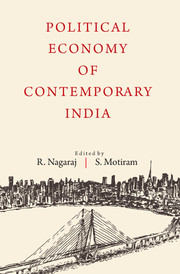Book contents
- Frontmatter
- Contents
- List of Tables and Maps
- List of Figures and Pictures
- Preface
- 1 Introduction: From ‘Intermediate Regime’ to Crony Capitalism
- Economy-wide Considerations
- 2 The Relationship between the Reserve Bank and the Government of India: Political Economy of Central Banking in India
- 3 The Limits of Liberalization: The Power Sector
- Political Economy by Regions of India
- Urban Labour Markets
- Land and Rural Labour
- About the Contributors
- Index
2 - The Relationship between the Reserve Bank and the Government of India: Political Economy of Central Banking in India
from Economy-wide Considerations
Published online by Cambridge University Press: 08 February 2018
- Frontmatter
- Contents
- List of Tables and Maps
- List of Figures and Pictures
- Preface
- 1 Introduction: From ‘Intermediate Regime’ to Crony Capitalism
- Economy-wide Considerations
- 2 The Relationship between the Reserve Bank and the Government of India: Political Economy of Central Banking in India
- 3 The Limits of Liberalization: The Power Sector
- Political Economy by Regions of India
- Urban Labour Markets
- Land and Rural Labour
- About the Contributors
- Index
Summary
Introduction
Can the political economy of an economic institution be captured solely in terms of the political economy of the aggregate economy? If a confluence of elite interest groups such as professionals, big business, and big farmers dictates the Indian economic policy configuration, do the same groups not define the political economy of central banking in India? If answers to such questions are in the affirmative, then looking into the political economy of a Central Bank could be somewhat superfluous. However, it has been noted, ‘The paradox is that while the state in India has been powerful (and often heavy-handed) in its regulatory and interventionist role, it will not be described as what the political economy literature calls a “strong state”’ (Bardhan, undated). Thus, in presence of a not-so-strong state in an emerging economy like India, various institutions can come up and assert their influence on the policy of their mandate. It is in this context that the political economy of Central Banking in India deserves special attention.
Admittedly, to a large extent, in mainstream economics, Central Banks have been widely seen as technocratic institutions handling monetary policy (and banking supervision in many cases), essentially enjoying a monopoly over monetary policy. Then the obvious question is: why can't a Central Bank perform as a specialised government department? After all, in a representative democracy, at a level of broad generalization, peoples’ aspirations are expected to be reflected in the elected government's functioning. Can then existence of Central Banks be explained solely in terms of the intricacies of financial markets (through which monetary policy operates) and the need for associated technical knowledge? Or, are there issues relating to objectives of the government and the Central Bank?
There is now a large literature in mainstream economics to the effect that a democratically elected government may have a tendency to utilize the trade-off implicit in short run Philips curve that generates an inflationary bias, which could be avoided by employing an independent Central Banker. This tension between the Central Bank and the government is, however, one angle to the story. In any market economy, the Central Banks operate through financial markets; also they often regulate financial institutions. What is the relationship between the Central Bank (both as a monetary policy maker as well as a financial regulator) and the financial institutions then?
- Type
- Chapter
- Information
- Political Economy of Contemporary India , pp. 25 - 51Publisher: Cambridge University PressPrint publication year: 2016
- 2
- Cited by



